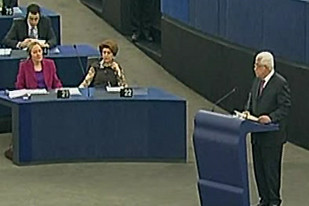
Palestinian Authority President Mahmoud Abbas addressing the European Parliament on the situation of people in Gaza. He said that Israel should be held responsible for the carnage., a photo by Pan-African News Wire File Photos on Flickr.
Abbas puts damper on bid to renew talks
By Amy Teibel and Mohammed Daraghmeh, Saturday, September 24, 8:33 PM
UNITED NATIONS — Palestinian President Mahmoud Abbas strongly suggested Saturday that he would reject a peacemaking blueprint put forward by international mediators, saying he would not agree to any proposal that disregarded Palestinian conditions for the resumption of peace talks.
Abbas, who returned to the West Bank on Saturday after submitting a statehood bid at the United Nations a day earlier, told reporters accompanying him that he was still studying the proposal by the peacemaking “Quartet” — the United States, the European Union, the United Nations and Russia.
But he said that “we will not deal with any initiative” that does not demand a halt to Israeli settlement construction or negotiations based on borders before the 1967 war, when Israel captured land the Palestinians claim for their state.
The Quartet statement made no such demands.
Abbas dug into his positions after resisting heavy, U.S.-led pressure to abandon his bid to have the United Nations recognize a state of Palestine in the West Bank, east Jerusalem and the Hamas-ruled Gaza Strip. His willingness to stand up to Washington has won him newfound respect at home, where he had been considered a lackluster leader. The unilateral bid for statehood and U.N. membership reflects deep-seated Palestinian exasperation over 44 years of Israeli occupation.
Israel has had no comment on the Quartet plan to resume long-stalled negotiations between the Palestinians and Israel, which mediators regard as the only way to establish a Palestinian state. Israeli Prime Minister Benjamin Netanyahu has rejected the long-standing conditions Abbas has put forth, saying talks must go forward without imposing terms.
Netanyahu opposes negotiations based on the 1967 lines, saying a return to those frontiers would expose Israel’s heartland to rocket fire from the West Bank. And he says the fate of settlements should be left to negotiations.
The Quartet urged both parties to draw up an agenda for peace talks within a month and produce comprehensive proposals on territory and security within three months. Mediators aspire to a final deal within a year, but similar plans have failed to produce a peace agreement, and this latest proposal offered no program for bridging the differences that have stymied negotiations for most of the past three years.
The Quartet plan was meant to rechannel to negotiations any momentum the Palestinians would gain from their statehood application. A U.N. nod would not deliver any immediate changes on the ground: Israel would remain an occupying force in the West Bank and east Jerusalem and continue to restrict access to Gaza, ruled by Palestinian Hamas militants.
But Palestinians are hoping that an upgrade in their international status would give them more clout in any future talks with Israel.
U.N. chief Ban Ki-moon relayed the Palestinians’ statehood request to the Security Council on Friday, shortly after Abbas formally submitted it. It is expected to be shot down there — because it will not win the required support of nine of the council’s 15 members, or because the United States will make good on its threat to veto it. The Security Council will meet Monday to deal with the membership request, but final action is likely to take weeks or months.
— Associated Press
No comments:
Post a Comment